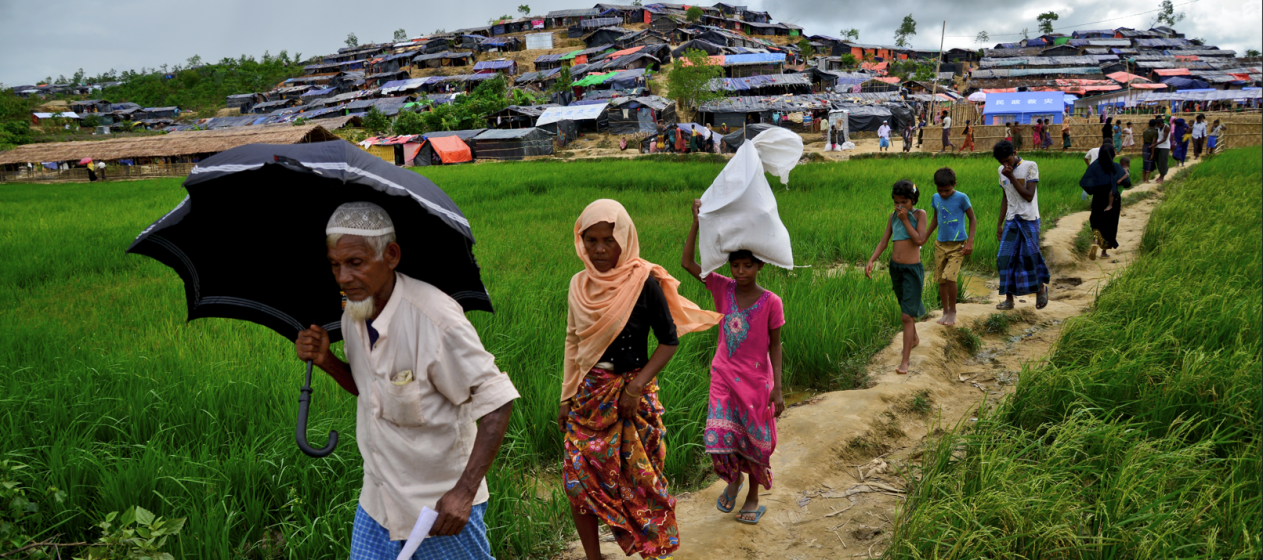The Rohingya refugee crisis as a trigger for displacement
For decades, the Rohingya, a predominantly Muslim ethnic group in Myanmar, have sought refuge in neighbouring Bangladesh to escape persecution. This influx, particularly since 2015, has strained Bangladesh’s limited resources. The persecution of the Rohingya is a textbook case of ethnic cleansing by Myanmar’s civilian-military government. With around one million Rohingya refugees in Bangladesh, concerns have been raised about the safety of the host population . Despite intense diplomatic efforts, Myanmar, governed by a military junta since 2021, remains reluctant to repatriate its Rohingya nationals, causing frustration in Bangladesh. Previous repatriation attempts in 2018 and 2019 failed due to the Rohingya refugees’ fear of violence upon return. In Rakhine State, where Rohingya once made up a third of the population, the Myanmar government has replaced entire Rohingya villages with government buildings. Returning Rohingya will not be granted citizenship. The timeline for their return to Myanmar remains uncertain, potentially prolonging their stay in Bangladesh. Providing the Rohingya with the basic necessities of life – food, shelter, and healthcare – remains a top priority for the international community, both now and until their eventual repatriation.
Threats to the displaced Rohingya population
The Rohingya minority suffers from a deplorable lack of human security because of their protracted displacement. Human trafficking poses as a significant threat to the already marginalised Rohingya refugees. Transnational human trafficking groups are actively considering how to exploit the plight of the Rohingya. UN agencies operating in Bangladesh have appealed to the international community for sufficient funding to meet the basic needs of the Rohingya population, describing the ongoing Rohingya crisis as a potential threat to human security.
The recurring problems faced by the refugees in their makeshift homes are food and health security. The conditions of the shelters are deplorable due to the perilous and unsustainable way of life. For the humanitarian community operating in Cox’s Bazar, a city on the south-eastern coast of Bangladesh, it is vital to prioritise the repair and restoration of the damaged shelters so that people can have at least some basic comfort, dignity, and protection from the elements. The Rapid Action Battalion, a counter-crime and counter-terrorism unit of the Bangladesh police, is working with the government, elected officials, and the general population to provide basic services to the Rohingya.
Rohingya influx strains Bangladesh’s social cohesion
Unemployed people will resort to any means necessary to survive. The influx of the Rohingya has intensified competition in the labour market, exacerbating tensions between them and the host communities. This, in turn, is straining the region’s socio-economic fabric and threatening social cohesion. The sympathetic attitude of the Bangladeshi population towards the Rohingya has declined significantly since 2018, and there is a growing perception that the influx of Rohingya has led to an increase in a range of anti-social and unlawful activities. Cultural differences remain a barrier for the Rohingya in their efforts to engage with other aspects of society. Language stands out as the most challenging factor in adapting to their new circumstances and hinders the education of the settlers’ children. To ensure cohesive and peaceful coexistence between the Rohingya and host populations, and to ease the massive burden on Bangladesh, the Rohingya refugees should continue to receive international humanitarian assistance, ideally through a coordinated plan of action by the international community.
The Rohingya crisis as a geopolitical flashpoint
China and India have sided with Myanmar on the Rohingya issue, motivated by their geopolitical and economic stakes in Myanmar. As a result, they have refrained from criticising the current government. Myanmar’s strategic value to China includes access to the Indian Ocean. China’s construction of the Kyauk Phyu port in Myanmar, which will serve as a base for an oil and gas pipeline and a road link between the Bay of Bengal and Yunnan province, aims to diversify supply routes and reduce dependence on the Middle East. The port also facilitates a unique trade zone in Myanmar’s Rakhine state. China’s ambitious Belt and Road Initiative therefore depends heavily on maintaining positive relations with Myanmar. Western criticism of Myanmar over the Rohingya situation has allowed China to improve its relations with Myanmar. Beijing has strongly supported the Myanmar regime both locally and internationally. China’s veto of a UN Security Council statement condemning the Myanmar military’s actions underscores its influence.
Although India has initially offered some assistance to the Rohingya refugees, New Delhi has so far refrained from actively promoting repatriation. Despite its friendly relations with Bangladesh, India has consistently supported Myanmar on the Rohingya issue at the UN and on a bilateral basis. Otherwise cordial relations between Dhaka and Nay Pyi Taw have suffered because of the failure to repatriate.
Although Russia has little strategic incentive to support China in Myanmar, it has expressed some concern about the Rohingya problem. Russia also seeks to establish a recognisable presence in the Indian Ocean. In this quest, Myanmar is important to Russia because it provides a port for Russian ships travelling to the Indian Ocean. Recently, Russia’s relations with Myanmar have improved. However, Moscow’s stance on the issue at the UN could potentially upset some allies among Muslim countries, such as Iran.
Recent diplomatic efforts by Bangladesh to persuade Myanmar to repatriate the Rohingya have faced significant challenges. Despite Bangladesh’s best diplomatic efforts, it appears that the country’s administration may not be able to send them all back in a one batch, despite the current dire situation. As a result, Bangladesh may need to formulate long-term strategies to deal with the growing Rohingya population within its borders.
Bangladesh’s approach to solving the Rohingya refugee crisis
Bangladesh’s stance on the Rohingya refugee crisis centres on the organised and compassionate repatriation of refugees to their homes in Myanmar. Bangladesh recognises the negative impact of a large permanent refugee population on the well-being of its citizens. To address this unfolding crisis, Bangladesh seeks to enlist the support of both international and regional powers to bring about an acceptable solution to this unfolding disaster.
Recent political upheaval and a democratic void in Myanmar, following growing tensions between the junta regime and the powerful anti-coup resistance, have prompted Bangladesh to strengthen its border with Myanmar through increased troop presence and surveillance. A firm diplomatic stance by Bangladesh could potentially trigger action by the US and European nations to find ways to address the democratic vacuum in Myanmar. To secure support and cooperation from Western countries, Bangladesh should strengthen its ties with the West by promoting academic, cultural, and commercial exchanges. At this juncture, Bangladesh needs a dynamic and well-coordinated approach to stem the flow of Rohingya and advance the restoration of their rights.
Moreover, the Chinese government’s response to the military takeover in Myanmar has changed the diplomatic landscape. Instead of integrating India into existing bilateral relations with China, Bangladesh should formulate a distinct strategy to engage major powers like India, China, the US, and others in line with its foreign policy objectives. The Ministry of Foreign Affairs could brief officials from these embassies on the situation and facilitate visits to the Rohingya camps as part of a comprehensive plan to support dignified repatriation efforts.
However, the safe, dignified, sustainable, and voluntary return of Rohingya refugees to Myanmar remains a challenge. According to Bangladeshi officials, a first group of 1,140 Rohingya refugees will be repatriated to Myanmar at an undisclosed time, followed by another 6,000 by the end of the year. To exert pressure on Myanmar, the UN Security Council should consider revisiting the Rohingya refugee camps and push for the establishment of “safe zones” for all those affected by the conflict. Meanwhile, Bangladesh must continue its diplomatic efforts and urge other nations to remain engaged, with the demand for safe conditions to facilitate the repatriation of the Rohingya being paramount. The goal is to remove the pervasive fear of persecution that plagues the Rohingya community.






